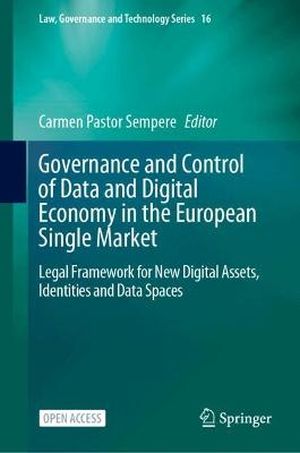
In an era where the digital realm is evolving at an unprecedented pace, the legal framework must adapt accordingly to ensure effective governance and control. This open access book explores the intricate web of regulations governing new digital assets, identities, and data spaces within the European Single Market. Through a comprehensive exploration of emerging concepts, it provides clarity amidst complexity and empowers stakeholders to navigate the evolving digital landscape with confidence, making it essential reading for legal professionals, policymakers, regulators, academics, and industry practitioners.
The book explains the need for legal adaptations to incorporate new technologies in the European Union, focusing on regulating Distributed-Ledger Technologies (DLT/Blockchain) and crypto-assets through the MiCA Regulation. It discusses the challenges and opportunities involved in ensuring stability and user protection and investigates the regulatory frameworks for Asset-Referenced Tokens, E-money Tokens, Utility Tokens, and Non-Fungible Tokens (NFTs). It also addresses related topics such as artificial intelligence, digital identities, data spaces, and cyber-security, providing an analysis rooted in European law that points to the European Roadmap to the Digital Decade for 2030. It deals with the European Digital Identity in the eIDAS2 Regulation and the Artificial Intelligence Act, both adopted in 2024, providing a lege ferenda perspective.
Additionally, the book examines Open Data and Open Finance, emphasizing their roles in promoting competition and innovation while addressing data privacy and security concerns. It covers the implications and challenges of Digital Money and Digital Payments, particularly in the context of the Digital Euro project, the impact on monetary policy and financial inclusion, and the European Digital Identity - the EU Digital Identity Wallet, EUDI - enabling mutual recognition of electronic identification systems across EU countries.